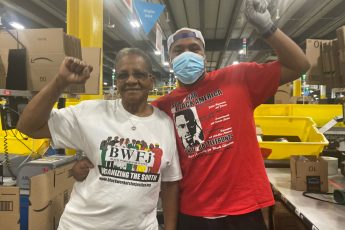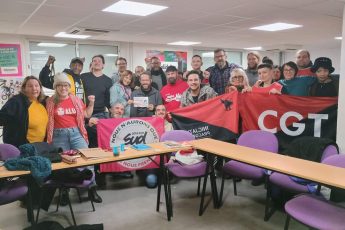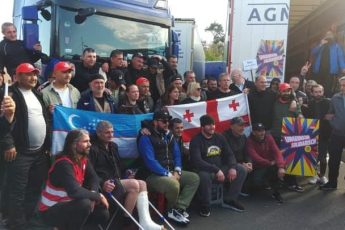
by TRANSNATIONAL SOCIAL STRIKE PLATFORM
We publish an interview to Jurgis and Linas, from the Lithuanian union (G1PS) who is currently engaged in supporting riders’ struggles, that are gaining momentum due to the increase in deliveries and related risks during the pandemic. The riders’ mobilization is placed in a framework of high costs of living, dropping wages and massive layoffs. While transnational dynamics impact strongly working conditions, starting from the fact that the delivery companies are international, the timid experiments of riders’ networking across borders have so far not involved Eastern European workers. Something that needs to be confronted, connecting strikes and struggles such as the one of the drivers in Georgia or the current mobilizations of couriers in Italy and elsewhere.
Can you tell us something about your union?
Jurgis: We are part of May 1st union (G1PS) , that was officially established few years ago and grew out of several initiatives. Firstly, in 2016 there were protests against a sudden increase of food prices after Lithuania introduced euro. These protests grew into a movement called “life is too expensive” and we ended up protesting against introduction of a new labor code, that was pushed in the parliament during the same summer. We managed to get the most drastic laws, such as zero-hour contracts, out of the project. After the protests, there was a large group of people who wanted to continue organizing, so we started a solidarity network and others were interested into creating a left media. The name “life is too expensive” is now taken by our media channel – gpb.lt. And May 1st union was established few years later after organising informally through the solidarity network.
Our goal as a union is to organize in the most precarious spheres, mainly the service and retail sectors – these are very huge sectors that have successfully blocked union initiatives. At the moment we are organising with food delivery couriers. Apart from that, we are working with some postal and railway workers. Most of the people contact us firstly for help, because we provide free legal consultations on facebook. We are a feminist union too – we see the importance of reproductive labor and reproductive rights and try to push other unions for more intersectional politics. So there are many initiatives that we try to support – we focus on organising in the workplaces, but we support other left initiatives too. I think we were neither happy with political movements that were based only in activist circles, neither with unions, that are strictly dedicated to “bread and butter” questions – so G1PS tries to search for ways of how to connect these struggles together.
In the last months you have supported the struggles of the riders in different cities in Lithuania. Can you tell us something about these struggles?
Linas: Yes, the courier association is a branch of our union. It started last summer when we provided help for Bolt food workers strike in Vilnius. At that time, the company lowered the rates of the deliveries, so the workers felt unsafe of their income and decided to organize a strike. Then we started to organize more and communicate more and negotiated with the management of the two major platforms active here, Wolt and Bolt Food. We are communicating with politicians in Lithuania, the main problem is the legal status of these workers, because the platform provides no usual work contract. The platforms consider couriers as “business partners”. This work here is very precarious: riders feel unsafe about their future and income.
What are your demands?
Jurgis: Basically, we are asking for more stable income and a minimum tariff no matter if you receive orders or not. They then need to limit the number of couriers to assure a certain number of orders, so that when they go to work, they have work and do not simply wait without being paid. The main thing is to have a more stable wage.
Linas: Another of the things we want to introduce has to do with health. If you get injured during work, you get no compensation. All the companies will have to insure their couriers. The work is too risky for the workers’ health.
So in your mobilization you are not focused on getting a regular work contract?
Jurgis: There are many discussions about this. At the moment, we realized that we cannot simply demand this work contract, because people are scared that they will have to work for eight hours a day and can not choose flexible hours anymore. The companies use this tactic to scare people. For example, there is a fb group, with 5000 couriers from different contractors. After the first negotiations, debates around the labor contract was triggered by people sent by the company saying that the introduction of a stricter regulation would imply a limitation of the “freedom” of self-employment…
Linas: Bolt food is an Estonian based company, more free market bad asses, with no security. Wolt is Finnish capital, and they provide more security. More foreigners work in this cheap company (Bolt) without stable income whereas the other one (Wolt) is making selections and provides more guarantees, for example, a Covid19 compensation, 700 euros for people who are positive or need to be in self-isolation. Wolt provides an option to get a guarantee payment: you take shifts in your app, you guarantee the company that you are going to work on that time exactly, if there are no orders you get guarantee payment, like 4.5 or 5 euro per hour. The other company doesn’t provide this option. On the contrary last year, they kept employing people, at some point there were so many that they didn’t get any orders. Then the Bolt Food workers started to complain and ask the company why they were continuing to employ new people if there is not enough work. In December they stopped hiring new people. They started to accept negotiating only because we took to the street, called the press, address politicians, so they had to listen to us. Now they are planning to introduce insurance for accidents, lost income and third-party liability, but we don’t know yet when they will introduce it. However, the question is also – who will pay for it? .
Who is currently doing the job of courier?
Linas: 90-95% of the riders are male, but the composition is diverse. We have migrants and locals who have lost their jobs during coronavirus crisis, young people and older people with 50 or 60 years old. Most of the foreigners are students, at least here in Kaunas, the second biggest city of Lithuania. It’s pretty diverse.
Jurgis: In the initial meeting when we founded the association, we had several people from India who were students in Lithuania, one guy from Italy. We had this talk about what would mean to demand full contract and one of the issues is that these people who are here as students would not be allowed to work if there were a full contract. I do not know if it is just Lithuania, or an EU regulation, you have different permissions to work if you enter to study. It is a barrier and we still did not have time to properly addressed these issues. We are trying to translate everything to English, but sometimes there is just not enough of time to do it. The companies, on the other hand, say that this kind of job does not need to have protections because it is presented as an additional job beside a more stable income.
In light of what you say, it seems that the couriers work is presented as an additional job that does not need income assurances, but in truth it is like this because the wage of just one job is not enough anymore….
Linas: Yes, I was a bartender before Covid19 and during the day I used just to jump on the bike to make few more euros, some extra income to cover rent and basic needs. My salary at my primary workplace was not enough. It’s especially hard in major cities because of high rent prices. Prices are getting higher and higher even during the crisis.
Jurgis: The cost of living is pretty high in Lithuania; the rent is very high. In Vilnius you would pay 700 or 800 euros for one flat, while the average wage is around 800 euros. So people are searching for ways to share the costs and earn additional money.
What did change with the pandemic?
Jurgis: 30% of those who are riders now have lost their job due to the pandemic, or they had to take downtime which the state compensates up to minimum wage, like 400 euros netto per month, so for most people it is not enough. This crisis hit women particularly hard – 75% of service, care and retail sector workers are women, also most of the workers employed part time are women. All the people working in restaurants, hotels, sanatoriums – they lost their jobs. For example, we know stories that employers fire people and promise that they will hire them after quarantine ends. Because their wages are the lowest, or they were employed part time, the compensations from the state are even lower than the 400 euros. On the other hand, we saw an exponential growth of delivery services – and not only platforms, but the biggest supermarket chains quickly expanded home-delivery services – and over one month, thousands of people moved to short-time jobs there. The real winner of the pandemic is the retail sector – while the small shops and markets were closed, the biggest supermarkets did not get any restrictions and their profits grew exponentially.
How did you help organizing the riders strike? What are the difficulties you encountered?
Linas: In the courier sector striking is much easier in a way: the only thing you need to do is mark on your app that you go offline and that’s it. There is no traditional job contract and couriers aren’t responsible to work all the time. They just need to go offline all at the same time. Of course, it is hard to organize because there will always be someone that would try to make a benefit of this situation and work and earn more.
Jurgis: The law on strikes here is one of the strictest in the EU. There are so many requirements: you need to have at least 50% workers agreeing with the strike, the demands can only concern wages or other workplace issues, so that political or solidarity strikes would be illegal and the organisers would be prosecuted. There are at least 3 steps of informing employers, having different commissions and meetings with employer, and if you don’t reach an agreement, only then you can go for strike. And since 2016, they legalized “lock-outs”, so employer can find other people to work while you are striking. All of this gives time to the employer to prepare or to do what they like to do most, that is to file an appeal to court. Most of the times, the court rules that the strike is illegal because some of the requirements were not fulfilled. There are some absurd rulings. For example, the court ruled that bus drivers have to ensure a 70% of services during strike, because otherwise the strike would endanger the public safety. At some point they forbade workers in a beer factory to strike because stopping the production of beer was treated as a “danger to national safety”. This is hilarious! So to make a legal strike is practically impossible. Of course, it is not only a legal question, but also about organisational capacity of a union. The only union that manages to organise a strike is the teachers’ union. In 2019 during a strike they occupied the ministry of education. They went there for negotiations but they did not find the minister. They decided to wait and in the end they stayed there for more than three weeks. The strike was supported by many people and, in a way, they popularized the notion of strike – people started talking about it more, they would say “we have to do the same as teachers did”.
Jurgis: Last months there were several small strikes. 20 or 30 people would say ‘let’s make one-hour strike’ and meet in some place, with bags on the roof of the cars, they would send pictures to the main chat and invite to join. There is this motivation to do it, but the numbers are usually small, and the company never reacted. But the problem is that you can get fired for any reason. They simply drop you out. For example, we got a complain of a woman that was blocked for three days because she was going together with another person, her son, in the car. She was taking her son because she was afraid of being attacked. She was harassed several times before. So the company dropped her out for three days, but only after we called them and asked to bring her back, they activated her account again.
Linas: To help organizing we expect to open a bike repair shop for business and we are planning to provide a space for bike couriers and a place to make tea or coffee and it would be a space safe to organize. We want to attract couriers from both companies and share each other’s problems. It would be better for all of us.
Do you have contact with couriers in other countries?
Jurgis: We talked with some Russian organizations that organize also in this field. It seems like they have even worse situations where the companies steal money. They try to mobilize other unions to stand up for couriers. We were also reading about these European gatherings, but from the maps of organisations you see that none of the Eastern European countries are there.
How did entering the EU change the working conditions?
Jurgis: There is a funny story of how we entered the EU. When there was the referendum on joining the EU, they had to extend the voting for two days, although the law does allow it, because not enough people showed up. So in the night, they came up with a plan: the main supermarket chain agreed to give a ticket to everyone who came to vote. With this ticket you could get for 1 cent washing powder or bier or a bar of chocolate. It worked…large crowds gathered to vote the next day.
Linas: It is hard to say if some factors related to wages are related to European Union. It is very similar to Poland. Now we have major labor migration and now there aree plenty of Ukrainians working as construction workers, cleaners and so on.
Jurgis: You have also to consider that things have changed lately: at the beginning when we entered the EU, many people went out especially during the financial crisis. Now you have this shortage of labor. Wages barely allow you to survive, but there is a lack of workers. Now there is growing migration from Ukraine and Belarus. Something new: it never used to be incoming migrants. Ten years ago, we were going elsewhere, now people are coming here. Some people come here, you work here for half a year and get money for then migrating to Denmark. You leave in cramp flats, you work for 16 hours a day, they are pushing themselves. They pay for entrance in better countries. It is still a gateway country to Western Europe.
Apart from labor migration, EU brought institutional reforms. Flexibilization and optimization became the new dogma for every government. This means implementing market methods into public sector: school, universities. Now they “liberalized” energy sector, meaning that different companies will sell the electricity and compete between each other. This is for sure an EU directive. We are still waiting to feel the effects, but everyone understands that the prices will go up. Because of EU regulation, they had to split the railway company into several branches – then usually the profitable parts are privatized, while the more “public services”, such as passengers transport, are kept public, but the prices increase so as to cover the “expenses”. At the moment, we have a centre-right government, by the way all led by women. It might appear as progressive, but do not be fooled: they are starting to talk about introducing some “fees” for public health services, which are the first steps to privatisation of healthcare.
Of course, sometimes it is hard to grasp the power relations, whether these reforms are local initiatives, or they are “brought down” by EU structures. But usually, the reforms that are pushed here, are the same ones that we see happening in such countries as Bulgaria or Romania. So there is a common tendency for regional politics. But only now, after 20 years, you can see that people start to understand that “flexibilisation and optimisation” do not bring any good. It is because people tend to see EU and “free-market” as a paradigm of “effectivity”, that will bring the prosperity to our country. Now things are a bit changing but criticizing EU economic policies is still seen as some kind of “non-sense” – if there are problems, it is only because wrong national politicians have been brought to government.





